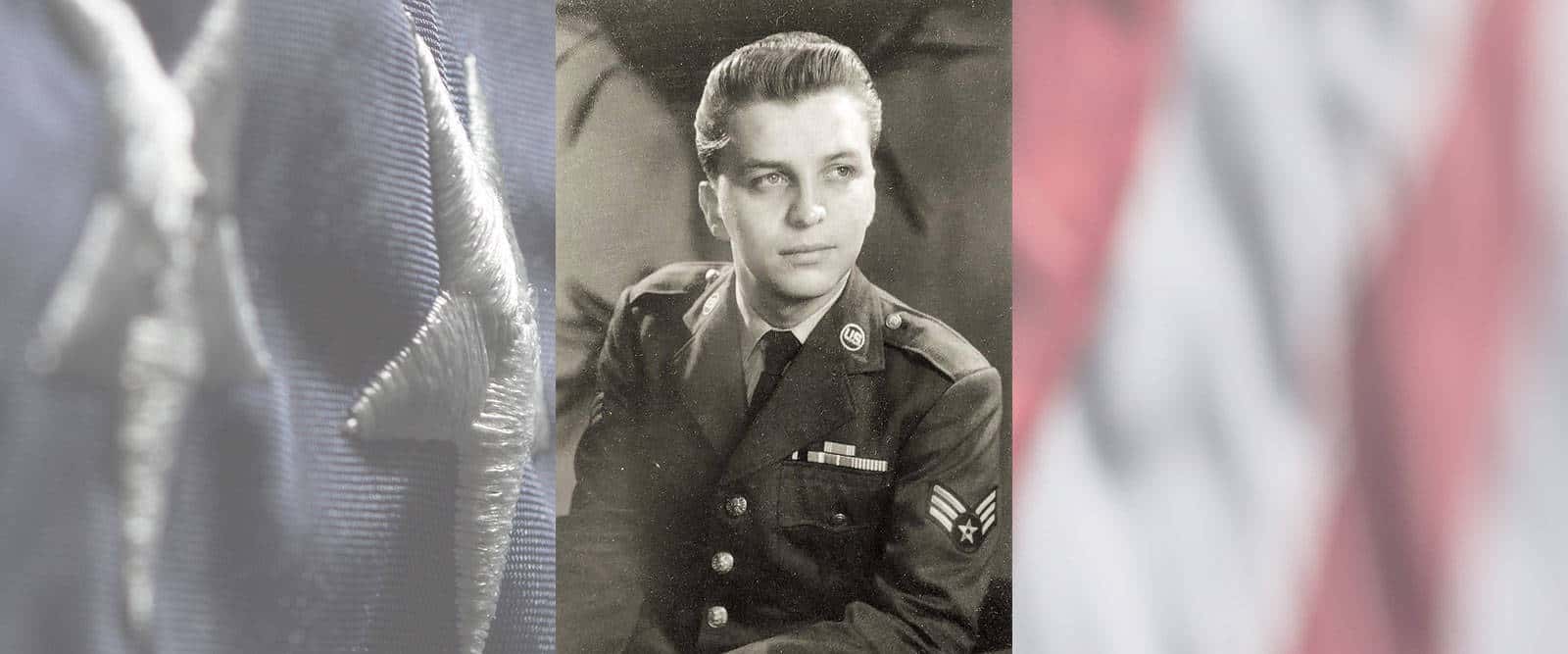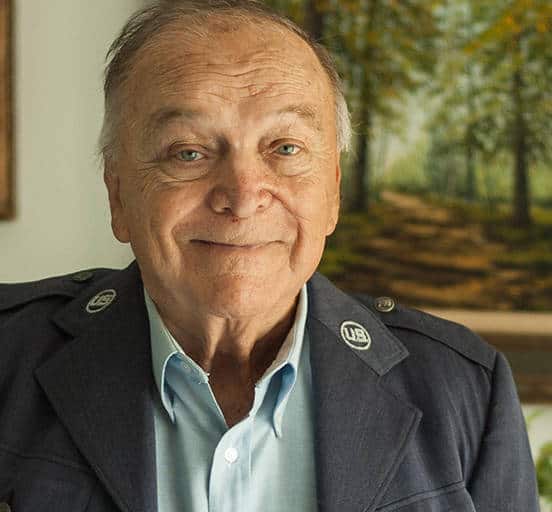U.S. Air Force Korean War Flossmoor, IL Flight date: 09/13/17
By Andy Dunning, Honor Flight Chicago Veteran Interviews Volunteer
Korean War veteran Frank Colin turned a youthful indiscretion into an opportunity to serve his country that led him down a pathway he now remembers with pride.
Raised on Chicago’s South Side, Frank was the youngest of nine children. He says he was always interested in the military, inspired by the service of his oldest brother, Anthony, a brigadier general who flew bombing missions in Germany and Japan during WWII. Anthony was part of the top-secret mission to drop an atomic bomb on Nagasaki, Frank says. Anthony would later be recalled to active duty during the Korean War. Another one of his brothers, David, served in the Marines during World War II and was wounded in the Battle of Tarawa.
Frank attended Tilden Technical High School, where he ran the school’s print shop. One day, school officials learned he was allowing his fellow students to print unauthorized material for profit and Frank was told to report to the principal’s office with his mother. Instead, Frank took enlistment papers to his mother and told her “they want me to join the Air Force. You have to sign this.” He joined the Air Force in 1949 at just 17 years old.
Frank completed basic training at Lackland AFB in San Antonio, Texas. The Air Force then sent him to the Army Security Agency Cryptologic School at Vint Hill Farms Station, Va. While there, he learned to code and decode top secret messages and earned his cryptology certification. Frank then studied cryptanalysis, learning to break enemy codes. Having proficiencies in both allowed him to rise up through the ranks quickly, he said.
After graduation, the Air Force sent Frank to Japan to work with a team of cryptologists for U.S. Army Gen. Douglas MacArthur, the Supreme Allied Commander during WWII, who then oversaw the occupation of Japan. “McArthur was a character,” he says. “And he liked having us Air Force guys around; he really loved our uniforms.”
The close-knit team worked in an office at the Army headquarters, located across the street from the Japanese Emperor’s Palace. They worked 24 hours a day, Frank says, with eight operators on each of three shifts. Frank worked the early shift, arriving at his desk at 1 a.m. and working till 9 a.m.
Each man sat at his desk entering the messages to encode on a mechanical cipher machine, called the M-209. The device measured only eight inches long and five inches wide and featured five sets of rotors marked with letters and numbers. Each message took approximately 30 minutes to complete, Frank says, and the codes were handed off to radio operators for transmission. The encrypted messages included reports on unit strength, orders for armaments and specifications for needed personnel, he says. “The machines were like mini computers, and my codes were received in Washington by nine in the morning.”
After finishing his shift, Frank had the whole day to himself, he says, and he liked to spend the time traveling. He bought a 1941 Chevy and “drove it up and down all three of Japan’s islands.” Life in Japan was very “Americanized” for the thousands of U.S. troops stationed there, he says. They could shop at a Marshall Field’s or enjoy the nightlife at the Noncommissioned Officers Club. Many of the servicemen were stationed in Japan for years at a time, he says, so they brought their families with them.
Frank rose in rank quickly, reaching Technical Sergeant by the time he was 18 years old. This would occasionally cause problems for the youthful officer. “I used to get stopped by the Army MPs all the time,” he says. “They thought I stole the uniform. I’d show my military I.D., but they were still suspicious.”
The Air Force cryptologists also doubled as MacArthur’s personal Honor Guard, welcoming high-ranking military officials and dignitaries who visited headquarters. The men donned their dress blue uniforms and carried chromium-plated Colt AR-15 rifles with the Colt 45 sidearm and stainless-steel helmets. They would line up along the walkway and stairs into the building, Frank says. During one of these ceremonies, he experienced one of his most memorable moments in Japan.
“We were welcoming a new general to headquarters, and as I stood there I heard a plop on my helmet,” he says. “I realized a pigeon had pooped on my head. MacArthur took two steps past me, stopped and back stepped to me. He asked, ‘is that an authorized decoration?’ He was very amused.”
After Frank was discharged in October 1953, he accepted a position with Merrill Lynch & Co., working from the company’s Chicago offices, where he sold stocks, options and commodities. Frank met his wife, Ernestine, in eighth grade. They married in 1955, moved to Flossmoor and raised three sons. After 25 years with the company, Frank retired and formed his own trading company, FC Options on the Chicago Board of Trade. Now fully retired, the couple enjoys spending time with their six grandchildren.
Thank you, Frank, for your service. Enjoy your well-deserved Honor Flight.




